Premium Only Content

Electoral College Deadlines Can Be Moved, 3384
Good evening, I’m still reporting on the Coup.
Guess what? The upcoming deadlines for state certifications and Electoral College deadlines are not mandated by the U.S. Constitution and there can be moved to facilitate complex election fraud investigations.
According to a study released on Friday, the Armistad Project of the nonpartisan Thomas More Society says that the only constitutionally set date in the election process is January 20th, when the next president of the United States will be sworn in. All other dates are dates set by federal law, which the paper argues are arbitrary and founded on obsolete concerns, such as the slowness of travel 200 years ago.
“Experts believe that the primary basis for these dates was to provide enough time to affect the presidential transition of power, a concern which is fully obsolete in the age of internet and air travel.” The Amistad Project said in a press release.
According to the Executive Summary of the study:
Executive Summary
The only Electoral College deadline specifically required by the Constitution is noon on January 20, at which point President Trump’s first term officially ends. All other deadlines — the “safe harbor” deadline of December 8, the Electoral College voting on December 14, and even the congressional vote count on January 6 — are dates set by federal law.1 Moreover, these dates are arbitrary, being based on obsolete and outdated concerns. It is also well established that the U.S. Constitution is the highest law in the land, holding precedence over both state and federal laws. In the event that federal law presents an obstacle to faithfully adhering to constitutional requirements, it is necessary to disregard the statute in favor of the plain meaning of the Constitution.
Understanding the “safe harbor” provision
The so-called “safe harbor” provision in federal law (3 USC 5) simply asserts that if a state has established laws governing the appointment of Electors, and a determination made according to that law has been made at least six days prior to December 14 (the date fixed by federal law for the Electoral College to convene), then that determination is final on December 8.2 The Supreme Court has ruled that the law does not actually require states to appoint Electors by that date in order for those Electoral Votes to be counted by Congress when determining the winner of the presidential election.3
In the current context, states have laws in place awarding presidential Electors according to the popular vote. Because the laws governing the vote were violated in numerous ways in several key states, certification of the election results cannot be said to have been made in accordance with the laws established in those states. Therefore, the responsibility still rests with state legislatures to appoint their state’s Electors, because no “determination made pursuant to such law” has actually been made.
Then the study summarizes the evidence of election fraud in Arizona, Georgia, Michigan, Pennsylvania & Wisconsin.
If you would like to read these summaries, go to:
https://bit.ly/SillReport3384
The importance of addressing fraud concerns prior to Inauguration Day
As has been demonstrated in this brief, there is significant flexibility and precedent in U.S. law for changing the date that electors are appointed, changing the date electors convene to vote, and changing the date electors have their vote certified by Congress.
We are less than 40 percent of the way from Election Day to Inaugural Day. This makes such a delay very reasonable, given the unprecedented thin margins between Trump and Biden in several states and the growing evidence of serious amounts of systemic electoral fraud. Meanwhile, Joe Biden and his supporters can continue with important transition work in the event a transfer of power does occur.
For the sake of American democracy and to strengthen our fraying social fabric, it is preferable to address the fraud issues before determining who is the next President. The investigations will be rigorous and continue whether or not the Electoral College vote is held December 14. For the sake of the country, Joe Biden and his supporters should welcome a fair and impartial investigation, especially because they are so confident they will prevail. Otherwise, a dark cloud will hang over the Biden Administration if it becomes clear his election was illegitimate, and the socio-political fragmentation that is occuring in the United States will only worsen.
19 Ibid
20 https://www.govtrack.us/congress/votes/44-2/h251
Conclusion
Election officials in urban Democrat strongholds are behaving similar to a football team which gained an advantage from a questionable play and are now running up to the line of scrimmage to begin the next play before America can throw the red flag on the field to demand a closer look.
The deadlines for the seating of electors and their voting, however, is not necessary for the effective transition of power. As we have established these deadlines were created for the convenience of travel, just as election day was placed uniformly on the first Tuesday after the first Monday in November to allow farmers to complete the fall harvest prior to voting. In other words, these dates have nothing to do with the transition of power and are largely not relevant to a time when electors do not have to ride horses to Washington, D.C. to vote. Accordingly, these dates should not interfere with state legislatures effectively investigating the management of the election, especially when we experience unprecedented manipulation of election rules calling into question hundreds of thousands of ballots. We have, and must have, time to get it right.
The Constitution explicitly assigns the power to appoint presidential Electors to the legislatures of the various states. Those state legislatures have established laws governing the conduct of elections and awarding presidential Electors according to the results of the popular vote. The “safe harbor” provision established by federal statute sets a deadline for determining Electors according to the laws in place for that purpose in each state.
Because the laws governing the conduct of elections were flagrantly violated in numerous states during the 2020 presidential election, there can be no determination of presidential Electors pursuant to state law. As such, the Constitution makes clear that the responsibility rests with state legislatures to appoint Electors. This should be done as expeditiously as possible, but the only deadline state lawmakers have an obligation to meet is the one deadline set forth in the Constitution — noon on January 20, 2021.
[insert]
I’m still reporting from just outside the citadel of American freedom. Good day.
Popular elections failed in numerous states
The Constitution instructs the states to appoint presidential Electors “in such Manner as the Legislature thereof may direct.” Since 1860, all states have passed laws awarding their electoral votes according to the popular vote in the presidential election.4 Two states, Maine and
1 https://crsreports.congress.gov/product/pdf/IF/IF11641
2 https://www.law.cornell.edu/uscode/text/3/5
3 https://supreme.justia.com/cases/federal/us/531/70/
4 https://www.nass.org/sites/default/files/surveys/2020-10/summary-electoral-college-laws-Oct20.pdf
The Constitution instructs the states to appoint presidential Electors “in such Manner as the Legislature thereof may direct.” Since 1860, all states have passed laws awarding their electoral votes according to the popular vote in the presidential election.4 Two states, Maine and Nebraska, award one electoral vote to the winner of the popular vote in each congressional district, but the remainder are awarded to the overall winner in the state. The Constitution also grants states the authority to establish the “times, places, and manner” of elections,5 which state legislatures have done by crafting laws governing how elections should be conducted. Yet, in at least five key swing states — Arizona, Georgia, Michigan, Pennsylvania, and Wisconsin — election laws were routinely and flagrantly violated by election administrators and state officials during the 2020 presidential election cycle.
Arizona
State officers and Maricopa County Officials failed to enforce the state law against private companies from directing federal election administration, accepting millions of dollars in private grants that gave some voters in the state access to advantages that were unavailable to voters in other parts of the state. These officials also allowed for gaps in the chain of custody of official ballots through the use of “mobile” drop boxes that are stationed in unsupervised public locations, failed to enforce the state law against double voting, and failed to enforce the state law against allowing people to vote using an address where they no longer live. As a result of these violations, data experts estimate that more than 300,000 potentially fraudulent ballots may have influenced the outcome of the popular vote in the state, including more than 200,000 illegal ballots that were counted and about 75,000 legal votes that were not counted.6
Georgia
Fulton County officials illegally accepted more than $6 million in private grants that imposed conditions on the conduct of elections without authority from the state legislature. In addition, state election officials entered into a settlement agreement with the Democratic Party that created rules for processing absentee ballots that directly contradict the legislature’s intent. Officials also failed to enforce state law residency requirements on voters who changed addresses before the November 3, 2020 election, leading to an estimated 20,000 unlawful ballots being improperly counted.
Data experts put the total number of illegal votes counted and legal votes not counted at more
than 200,000, far greater than the margin separating Joe Biden and Donald Trump in the state.7
5 https://www.law.cornell.edu/constitution-conan/article-1/section-4/clause-1
6 Superior Court of the State of Arizona in and for the County of Maricopa Case No. CV 2020-096490 7 Fulton County (GA) Superior Court Case No. 2020CV342959
Michigan
Michigan Secretary of State Jocelyn Benson gave private activist organizations direct access to a state law requiring signatures for absentee ballot requests by establishing online voter registration without statutory authority, and unilaterally decided — without legislative approval — to send absentee ballot request forms to every household in the state, without even checking to see whether the registered voters listed for each address had died or moved.
Michigan election officials also failed to provide meaningful observation of the vote counting process, a violation of the Michigan Constitution [Const. 1963, art 2, § 4(1)(h)], as well as state statute [MCL § 168.765a(12)]. The refusal to allow observers to oversee the process resulted in significand abnormalities. In Detroit, for instance, 71% of the city’s 134 Absent Vote Counter Boards (AVCB) were left unbalanced without explanation.
As a result of these violations, data experts identified more than 500,000 potentially fraudulent ballots.8
Pennsylvania
Urban counties such as Allegheny (Pittsburgh), Philadelphia, and Delaware County received over $10 million in private grants that imposed strict conditions on the conduct of elections without legislative approval, violating state laws prohibiting the use of private money to pay for federal elections. In addition, election officials took unlawful steps to pre-canvass mail-in ballots and help voters “cure” flawed ballots that had missing or incorrect information or otherwise failed to meet legal criteria designed to prevent fraud.
Secretary of State Kathleen Boockvar also exceeded her authority by issuing guidance granting permission for counties to engage in these unlawful practices. She issued this guidance less than 24 hours before polls closed — insufficient time for counties that had not engaged in those practices to take advantage of them, even if the guidance were legitimate.
These practices resulted in well over 100,000 potentially fraudulent ballots, according to
analysis by data experts.9
Wisconsin
Wisconsin law requires photo ID for absentee ballot requests, specifically to prevent fraud. Notably, the law mentions the legislature’s intent “to prevent overzealous solicitation of absent electors who may prefer not to participate in an election.”
8 Michigan Supreme Court Case No. 162286
9 Metcalfe, Daryl D, et al. v. Wolf, Bookvar, et al, Commonwealth Court of Pennsylvania Complaint Filing WCMWHB00816378
The Wisconsin Election Commission also violated state law by allowing voters to claim “indefinite confinement” as a means of avoiding the legal requirement to provide a photo ID when requesting an absentee ballot. The legislature established this exemption for the elderly and disabled, yet many of the individuals who claimed it in 2020 subsequently left their homes to participate in family outings, political protests, and other activities that directly contradict their claim to have been “indefinitely confined.”
Data experts estimate that more than 150,000 votes were affected by these violations, including nearly 100,000 illegal ballots cast by individuals falsely claiming to be indefinitely confined.10
*****
Despite the obvious problems that occurred on election day in a number of states, election officials in urban, Democratic strongholds are refusing to allow access to ballots, ballot envelopes, surveillance video of counting centers and video of loading docks and receiving docks, dropbox logs or video of dropbox locations.
Forensic examination of the ballots is necessary to determine the validity of the ballots. An enormous amount of information is available from examining ballots.
Surveillance video has already revealed fraudulent ballots being counted in Atlanta and video surveillance and GPS information is available to corroborate sworn testimony by US Postal employees and subcontractors with the US Postal Service that hundreds of thousands of ballots were moved across state lines. Thus far, officials have refused to release any of this evidence.
Current Electoral deadlines are merely current Federal statute, not Constitutional law
In 1789 electors were appointed on the first Wednesday of January, electors met on the first Wednesday in February, and the Electoral vote was tabulated by a joint session of Congress on the first Wednesday of March.11
For over half a century, from 1792 until 1844, electors had to be appointed any time within the 34 days before the first Wednesday in December, and the electors met and voted on the first Wednesday in December.12
For 139 years, in every election between 1792 and 1932 except the 1876 election, the Electoral vote was tabulated by Congress on the second Wednesday in February.13
10 Wisconsin Supreme Court Case No. 2020AP1930-OA
11 Resolution of 13 September 1788 by the Confederation Congress 12 1 Stat. 239, Sec 1-2
13 1 Stat. 239, Sec 5
For 44 years, between 1888 and 1932, the Electors met and voted on the second Monday in January.14
A single national day for appointing electors (i.e., voting) nationally wasn’t established until 1848.15 Moreover, Tuesday was picked based on obsolete religious and agricultural concerns. In the 1800s, most citizens worked as farmers and lived far from polling places. Since it often took people at least a day to travel to a polling place, lawmakers needed a two-day window for Election day. Weekends were out of bounds because Sunday was for Church, and Wednesday was market day for farmers.
Finally, current dates for Electors meeting and voting, and Congress tabulating Electoral votes, have only been Federal law since 1948.16
Appointment of Electors by statewide popular vote is local legal custom, not Constitutional law
For instance, South Carolina didn’t adopt electors by statewide popular vote until 1860.
There is precedent for delaying/changing election deadlines in the event of unclear or questionable results or other circumstances
March 4, 1789 was the earliest date on which the Electoral Vote could be formally counted by Congress during the first election, but The First Congress did not achieve a quorum in both houses (necessary in order to hold a Joint Session of the entire Congress) until 6 April 1789, so the Electoral Vote coming out of the first Presidential Election was not counted and tabulated by Congress until that date.17
In the 1876 election, it became apparent, well before the Tabulation Joint Session of Congress was scheduled to meet on 14 February 1877, that something was terribly wrong with the Electoral Vote coming out of the meetings of more than a few "electoral colleges" held on 6 December 1876. Not only would the Electoral Vote be close (as could be easily discerned from the reports of the popular returns in each State as already published in newspapers around the Nation,) but at least three States in the South (as it was the post-Civil War Reconstruction era) were sending two sets of Electoral Votes — one in favor of each Major Party’s candidate. To make matters worse, one of these Major Parties controlled one house of the outgoing Congress, while the second Party controlled the other house leaving no possibility of a Party line vote in Congress.18
14 24 Stat. 373, Sec 1
15 5 Stat. 721
16 62 Stat. 675 3 USC 7, 15
17 https://www.thegreenpapers.com/Hx/ElectoralCollege.html 18 Ibid
To this end, Congress quickly passed legislation (signed into law by outgoing President Grant on 29 January 1877) completely bypassing the usual process of Electoral Vote counting, instead requiring Congress to hold what would otherwise be the normal Tabulation Joint Session early — in this case, on 1 February 1877 — to discern just which States were in dispute. Congress then formally handed those disputes over to a so-called "Electoral Commission" consisting of Senators, Congressmen, and U.S. Supreme Court Justices appointed to the task by Congress.19
The earlier-than-usual meeting of Congress in Tabulation Joint Session was intended to buy the Electoral Commission more time to resolve these disputes before the looming 4 March 1877 deadline, on which date a new President would have to take office. By a combination of constitutional fiat and Federal statute, President Grant's term ended — no matter what — on that date.
A Joint Session to count and tabulate the disputed State's Electoral Vote as decided by the Electoral Commission was held on 2 March 1877, just two days before the new President [Rutherford B. Hayes] would constitutionally take office.20
The importance of addressing fraud concerns prior to Inauguration Day
As has been demonstrated in this brief, there is significant flexibility and precedent in U.S. law for changing the date that electors are appointed, changing the date electors convene to vote, and changing the date electors have their vote certified by Congress.
We are less than 40 percent of the way from Election Day to Inaugural Day. This makes such a delay very reasonable, given the unprecedented thin margins between Trump and Biden in several states and the growing evidence of serious amounts of systemic electoral fraud. Meanwhile, Joe Biden and his supporters can continue with important transition work in the event a transfer of power does occur.
For the sake of American democracy and to strengthen our fraying social fabric, it is preferable to address the fraud issues before determining who is the next President. The investigations will be rigorous and continue whether or not the Electoral College vote is held December 14. For the sake of the country, Joe Biden and his supporters should welcome a fair and impartial investigation, especially because they are so confident they will prevail. Otherwise, a dark cloud will hang over the Biden Administration if it becomes clear his election was illegitimate, and the socio-political fragmentation that is occuring in the United States will only worsen.
Conclusion
19 Ibid
20 https://www.govtrack.us/congress/votes/44-2/h251
Election officials in urban Democrat strongholds are behaving similar to a football team which gained an advantage from a questionable play and are now running up to the line of scrimmage to begin the next play before America can throw the red flag on the field to demand a closer look.
The deadlines for the seating of electors and their voting, however, is not necessary for the effective transition of power. As we have established these deadlines were created for the convenience of travel, just as election day was placed uniformly on the first Tuesday after the first Monday in November to allow farmers to complete the fall harvest prior to voting. In other words, these dates have nothing to do with the transition of power and are largely not relevant to a time when electors do not have to ride horses to Washington, D.C. to vote. Accordingly, these dates should not interfere with state legislatures effectively investigating the management of the election, especially when we experience unprecedented manipulation of election rules calling into question hundreds of thousands of ballots. We have, and must have, time to get it right.
The Constitution explicitly assigns the power to appoint presidential Electors to the legislatures of the various states. Those state legislatures have established laws governing the conduct of elections and awarding presidential Electors according to the results of the popular vote. The “safe harbor” provision established by federal statute sets a deadline for determining Electors according to the laws in place for that purpose in each state.
Because the laws governing the conduct of elections were flagrantly violated in numerous states during the 2020 presidential election, there can be no determination of presidential Electors pursuant to state law. As such, the Constitution makes clear that the responsibility rests with state legislatures to appoint Electors. This should be done as expeditiously as possible, but the only deadline state lawmakers have an obligation to meet is the one deadline set forth in the Constitution — noon on January 20, 2021.
[insert]
I’m still reporting from just outside the citadel of American freedom. Good day.
-
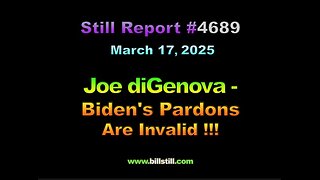 6:22
6:22
The Still Report
23 days agoJoe diGenova - Biden's Pardons Are Invalid !!! , 4689
1.65K9 -
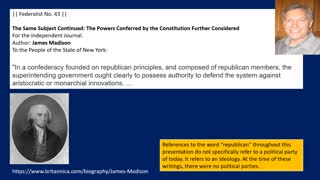 22:19
22:19
What Is Truth
4 years ago $1.95 earnedElectoral College
2.51K4 -
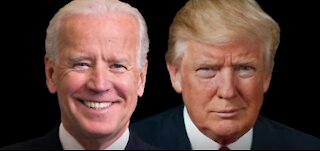 1:51
1:51
KTNV
4 years agoWhat happens in an Electoral College tie?
588 -
 0:10
0:10
iamDarrylJones
4 years agoWaiting for Electoral College Like!
90 -
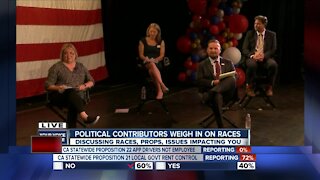 1:08
1:08
KERO
4 years ago23ABC political analysts discuss the Electoral College
50 -
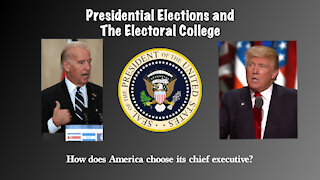 0:56
0:56
The Constitution Study
4 years ago $0.23 earnedPresidential Elections and the Electoral College
788 -
 0:10
0:10
DarrylJones
4 years ago $0.01 earnedWaiting for Electoral College to decide.
1991 -
 1:14
1:14
Newsy
4 years agoPres. Trump Will Leave If Electoral College Seats Biden
6.02K10 -
 3:21
3:21
KGTV
4 years agoIn-Depth: How the Electoral College works
272 -
 19:38
19:38
The Chris Russell Show
4 years ago $0.40 earnedWhat happening with the electoral college maps
5011